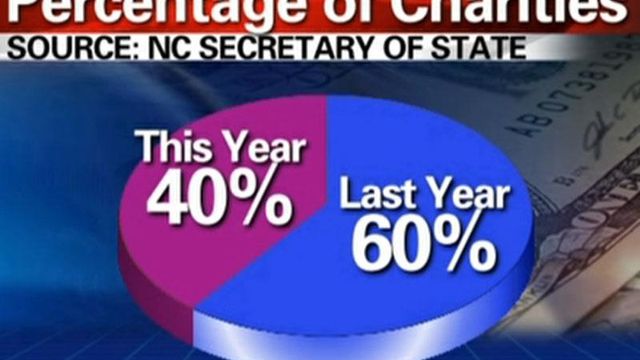Report: Charities make little by using professional fundraisers
Charities licensed by the state collected almost $26 million less in the year ended in June than in the previous year, but they wound up with more money by cutting overhead costs, according to a report issued Wednesday.
Posted — Updated“These numbers are a wake-up call that professional fundraisers and the organizations that use them must do better in these difficult economic times,” Secretary of State Elaine Marshall said in a statement. “More than ever, I urge people who give to charities to ask questions and research the groups that interest them to make sure their donations will be used wisely.”
"We were quite pleased that North Carolinians were so generous," Marshall said. But the report should give donors pause, she said.
From July 1, 2008, to June 30, campaigns run by paid solicitors generated $281.7 million in donations, up from $239.1 million during the previous year. Still, nonprofit groups received only $114.9 million of the money raised in fiscal 2008-09, down from $142.9 million the previous year.
In 44 cases, or more than 10 percent of total events during the most recent year, paid fundraisers took all of the donated money and turned over nothing to the charities that hired them, Marshall said.
"Sadly, these new numbers break a trend of the percentages getting better in years past,” she said. “It is extremely difficult to see exactly why this year’s plunge happened. We certainly hope no one in the nonprofit community is going to be satisfied at letting fundraising costs remain so high.”
Two organizations – the Veterans of Foreign Wars and the Gay and Lesbian Alliance Against Defamation – netted 100 percent of the monies raised for them. Another 18, including the American Red Cross, the March of Dimes and the North Carolina History Museum Foundation, received more than 90 cents on every dollar raised.
Charities that do not outsource fundraising, like the SPCA of Wake County, keep more of the money that donors give.
Marshall recommends that donors should look at several years worth of annual reports on their favorite charities to get a precise picture of their relationships with solicitors. Also, donors may request financial information directly from the charity.
“The bottom line is, if you see something in the report that disturbs you about a charity you support, get more information about what happened, and then decide if you feel they have earned your continued support,” she said.
She recommended that people give locally.
"I recommend to people to invest in something right here in N.C. – something where you can drive up to where they're operating, and you can see them. You can look them in the eye. you can get a feel to what they're doing and how they're doing it," she said.
The Secretary of State’s Office licenses charities and nonprofit groups that use professional fundraising services for their solicitation campaigns, compensate their officers or raise at least $25,000. Charities affiliated with religious or educational institutions or volunteer fire departments are exempt from state regulation.
• Credits
Copyright 2024 by Capitol Broadcasting Company. All rights reserved. This material may not be published, broadcast, rewritten or redistributed.





